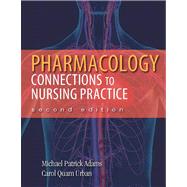
Unit 1. Fundamental Principles of Pharmacology
1. Introduction to Pharmacology: Concepts and Connections
2. Drug Regulations
3. Principles of Drug Administration
4. Pharmacokinetics
5. Pharmacodynamics
6. Adverse Drug Effects and Drug Interactions
7. Medication Errors and Risk Reduction
8. Pharmacology of Substance Abuse
Unit 2. Pharmacology and the Nurse-Patient Relationship
9. Pharmacology and the Nursing Process
10. Pharmacotherapy During Pregnancy and Lactation
11. Pharmacotherapy of the Pediatric Patient
12. Pharmacotherapy of the Geriatric Patient
13. Psychosocial, Gender, and Cultural Influences on Pharmacotherapy
14. Pharmacotherapy and Population-Based Care
15. The Role of Complementary and Alternative Therapies in Pharmacotherapy
Unit 3. Pharmacology of the Autonomic Nervous System
16. Review of Neurotransmitters and the Autonomic Nervous System
17. Cholinergic Agonists
18. Cholinergic Antagonists
19. Adrenergic Agonists
20. Adrenergic Antagonists
Unit 4. Pharmacology of the Central Nervous System
21. Review of the Central Nervous System
22. Pharmacotherapy of Anxiety and Insomnia
23. Pharmacotherapy of Mood Disorders
24. Pharmacotherapy of Psychoses
25. Pharmacotherapy of Degenerative Diseases of the Central Nervous System
26. Pharmacotherapy of Seizures
27. Pharmacotherapy of Muscle Spasms and Spasticity
28. Central Nervous System Stimulants and Drugs for Attention/Deficit Hyperactivity Disorder
29. Pharmacotherapy of Severe Pain and Migraines
30. Anesthetics and Anesthesia Adjuncts
Unit 5. Pharmacology of the Cardiovascular System
31. Review of the Cardiovascular System
32. Pharmacotherapy of Hyperlipidemia
33. Calcium Channel Blockers
34. Drugs Affecting the Renin-Angiotensin-Aldosterone System
35. Diuretic Therapy and the Pharmacotherapy of Renal Failure
36. Pharmacotherapy of Fluid, Electrolyte, and Acid-Base Disorders
37. Pharmacotherapy of Hypertension
38. Pharmacotherapy of Angina Pectoris and Myocardial Infarction
39. Pharmacotherapy of Heart Failure
40. Pharmacotherapy of Dysrhythmias
41. Pharmacotherapy of Coagulation Disorders
42. Pharmacotherapy of Hematopoietic Disorders
Unit 6. Pharmacology of Body Defenses
43. Review of Body Defenses and the Immune System
44. Pharmacotherapy of Inflammation and Fever
45. Immunostimulants and Immunosuppressants
46. Immunizing Agents
Unit 7. Pharmacology of the Respiratory System and Allergy
47. Pharmacotherapy of Asthma and Other Pulmonary Disorders
48. Pharmacotherapy of Allergic Rhinitis and the Common Cold
Unit 8. Pharmacology of Infectious and Neoplastic Disease
49. Basic Principles of Anti-Infective Pharmacotherapy
50. Antibiotics Affecting the Bacterial Cell Wall
51. Antibiotics Affecting Bacterial Protein Synthesis
52. Fluoroquinolones and Miscellaneous Antibacterials
53. Sulfonamides and the Pharmacotherapy of Urinary Tract Infections
54. Pharmacotherapy of Mycobacterial Infections
55. Pharmacotherapy of Fungal Infections
56. Pharmacotherapy of Protozoan and Helminthic Infections
57. Pharmacotherapy of Non-HIV Viral Infections
58. Pharmacotherapy of HIV-AIDS
59. Basic Principles of Antineoplastic Therapy
60. Pharmacotherapy of Neoplasia
Unit 9. Pharmacology of the Gastrointestinal System
61. Review of the Gastrointestinal System
62. Pharmacotherapy of Peptic Ulcer Disease
63. Pharmacotherapy of Bowel Disorders and Other Gastrointestinal Conditions
64. Vitamins and Minerals
65. Enteral and Parenteral Nutrition
66. Weight Reduction Strategies and the Pharmacotherapy of Obesity
Unit 10. Pharmacology of the Endocrine System
67. Review of the Endocrine System
68. Hypothalamic and Pituitary Drugs
69. Pharmacotherapy of Diabetes Mellitus
70. Pharmacotherapy of Thyroid Disorders
71. Corticosteroids and Drugs Affecting the Adrenal Cortex
72. Estrogens, Progestins, and Drugs Modifying Uterine Function
73. Drugs for Modifying Conception
74. Drugs for Disorders and Conditions of the Male Reproductive System
Unit 11. Additional Drug Classes
75. Pharmacotherapy of Bone and Joint Disorders
76. Pharmacotherapy of Dermatologic Disorders
77. Pharmacotherapy of Eye and Ear Disorders
78. Emergency Preparedness: Bioterrorism and Management of Poisoning
Glossary
Appendices
A. Answers to Critical Thinking Questions, Case Study, and NCLEX-RN® Review
B. Top 200 Drugs Ranked by Number of Prescriptions
C. Canadian Drugs and Their U.S. Equivalents.
D. Oral Dosage Forms That Should Not be Crushed
E. High Alert Medications
F. Confused Drug Names
The New copy of this book will include any supplemental materials advertised. Please check the title of the book to determine if it should include any access cards, study guides, lab manuals, CDs, etc.
The Used, Rental and eBook copies of this book are not guaranteed to include any supplemental materials. Typically, only the book itself is included. This is true even if the title states it includes any access cards, study guides, lab manuals, CDs, etc.